The CrimSL Research Cluster for The Study of Racism and Inequality (CSRI) is pleased to announce four awards to support projects that are concerned with how systemic racism, colonialism, gendered and sexual violence, exclusion, and other forms of structural inequality shape knowledge production and everyday life on multiple scales.
In keeping with CSRI’s vision of growing a far-reaching network of people who build, share, and mobilize knowledge to create more equitable societies, CSRI was pleased that almost half the applications came from researchers beyond the University of Toronto. As well as receiving inspiring project proposals from U of T, submissions were also received from across Ontario and across the country reaching to Edmonton and British Columbia and beyond academia to community projects.
CSRI was able to fund approximately 30% of project applications received as a result of its Fall 2024 Call for Proposals and is pleased to support the following:
Knowledge Mobilization with Black & Racialized Communities on the topic of Use-of-Force | Kojo Damptey (McMaster University, School of Social Work)
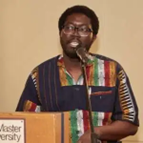 |
Kojo Damptey is a sessional instructor for the African & Black Diaspora Studies program and a PhD student in the School of Social Work at McMaster University. He is an interdisciplinary scholar practitioner and musician dedicated to fostering a world free of injustice. As a decolonial advocate/scholar, Kojo integrates his academic insights and artistic talents to challenge and dismantle systemic oppression. His academic work revolves around the broad discipline of African & Black Studies, particularly around governance, African Indigenous Knowledge Systems and politics in Africa. |
Systemic and Institutional Anti-Palestinian Racism in Greater Toronto and Hamilton Area Public School System | Wafaa Hasan, Project Lead (Assistant Professor, Women and Gender Studies Institute, University of Toronto) with Nadiya Ali (Department of Sociology, Trent University), Muna Saleh (Faculty of Education, Concordia University of Edmonton) and Sheliza Ibrahim (Institute for the Study of University Pedagogy, University of Toronto)
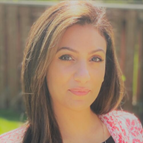 |
Wafaa Hasan is a community-engaged researcher, author, and public speaker. Her academic research is based in decolonial, transnational feminist studies with a particular focus on anti-racist solidarity practices. She has published on topics such as Palestinian childhood in Canadian literature; Islamophobia; imperial feminisms; decolonial feminisms; critical pedagogies; anti-oppressive research methodologies; and global practices of resilience in displacement in Countering Displacements: The Creativity and Resilience of Indigenous and Refugee-ed Peoples (University of Alberta Press, 2012). Her recent book chapter "Fragmented Bodies 'Dancing on the Spot': The Transnational Lives of Canadian Muslims and the Limits of Anti-Islamophobia Advocacy" was published in Systemic Islamophobia in Canada: A Research Agenda (2022) (named a Top 100 Book for 2023 in The Hill Times). Her latest co-authored piece called "An Inherently Decolonial Existence: Defining Palestinian Feminist Praxis" will be featured in The Sage Handbook of Decolonial Theory in summer 2025. |
Healthcare discrimination and access issues for Black and Indigenous people experiencing homelessness | Ashley Wilkinson (PhD candidate, School of Health Sciences, University of Northern British Columbia)
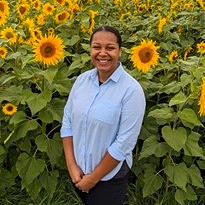 |
Ashley Wilkinson, a Black scholar and Health Sciences PhD candidate at the University of Northern British Columbia, resides on the traditional territory of the Anishinaabe Peoples of northwestern Ontario. Passionate about health equity, anti-racism, and the health of racialized communities, Ashley's research explores these critical areas. Her master's work at Lakehead University investigated barriers to culturally safe care for Indigenous Peoples in Canada and Māori in Aotearoa/New Zealand. Currently, her doctoral research examines the impact of racism on healthcare access and quality for Black and Indigenous individuals experiencing homelessness. In addition to her studies, Ashley is a Research Coordinator with At Home in the North, supports the Thunder Bay Homeless Individuals and Families Information System (HIFIS) team, and is an avid volunteer. |
Get to Know Your River Is Indigenous Research: Decolonizing Municipal and Provincial Bylaws, Building Relations with Ziibii (the Credit River) | Giidaakunadaad Nancy Rowe & Bonnie McElhinny (New College and Women and Gender Studies Institute, University of Toronto)
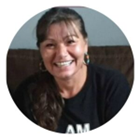 |
Giidaakunadaad (The Spirit who lives in high places) Nancy Rowe is Michizaagiig, Ojibwe of the Anishinaabek Nation, located at New Credit First Nation. She is a recognized Knowledge Keeper and Representative of New Credit. She holds an honours BA in Indigenous Studies and Political Science. She founded Akinomaagaye Gaamik lodge in 2014, to provide educational opportunities for all interested in Indigenous perspectives on life, health, education, history, and the environment. Akinomaagaye Gaamik has many partnerships that support ongoing education in Ontario, boards of education, Ontario Principals' Council, Ontario Human Rights Commission, Ontario Teachers' Federation, Ministry of Education, University of Toronto and Indigenous organizations. |
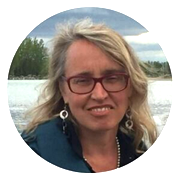 |
Dr. Bonnie McElhinny is Professor of anthropology and women and gender studies at the University of Toronto. She directs Great Lakes Waterwork/Water Allies (waterallies.com), and is part of the Water Pathways research cluster at the University of Toronto Scarborough. Her books include Language, Capitalism, Colonialism (with Monica Heller). Bonnie is of Irish, Slavic, German, French, and English descent. She grew up at the confluence of the Connoquenessing River and Glade Run, on Seneca, Lenape, and Shawnee territory, and is writing a book, The River Runs a Long Way Straight Here, about these rivers. Giidaakunadaad and McElhinny have held two previous grants together: Thirteen Moon Journey (Ontario Indigenous Cultural Fund) and Thirteen Moon Journey/Water Gathering (SSHRC Connection Grant for Building Indigenous Research Capacity/Reconciliation). In 2019, Giidaakunadaad and McElhinny participated in a national gathering sponsored by SSHRC to share insights on Indigenous research methodologies. |
Congratulations to each of the awardees, who will share their knowledge with the Cluster community during the 2025-2026 academic year.


